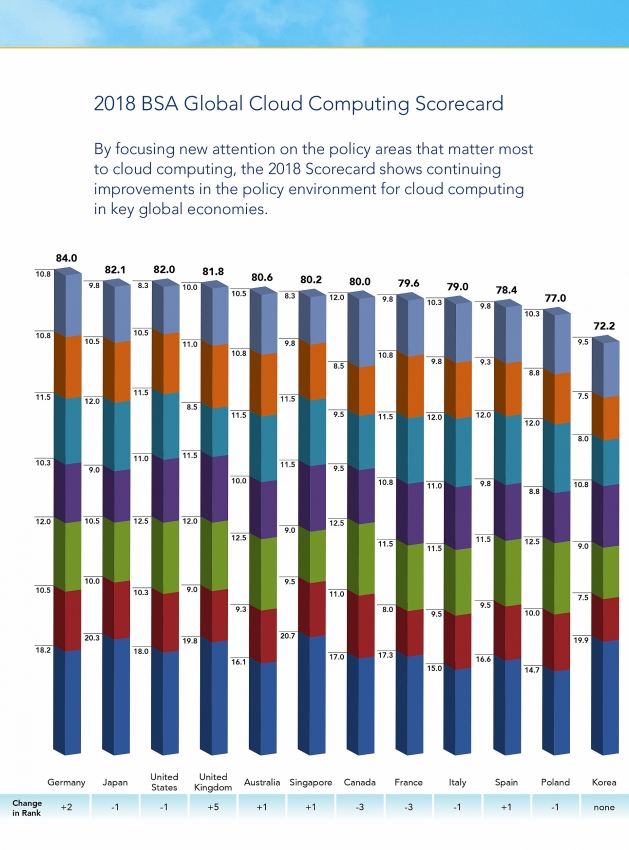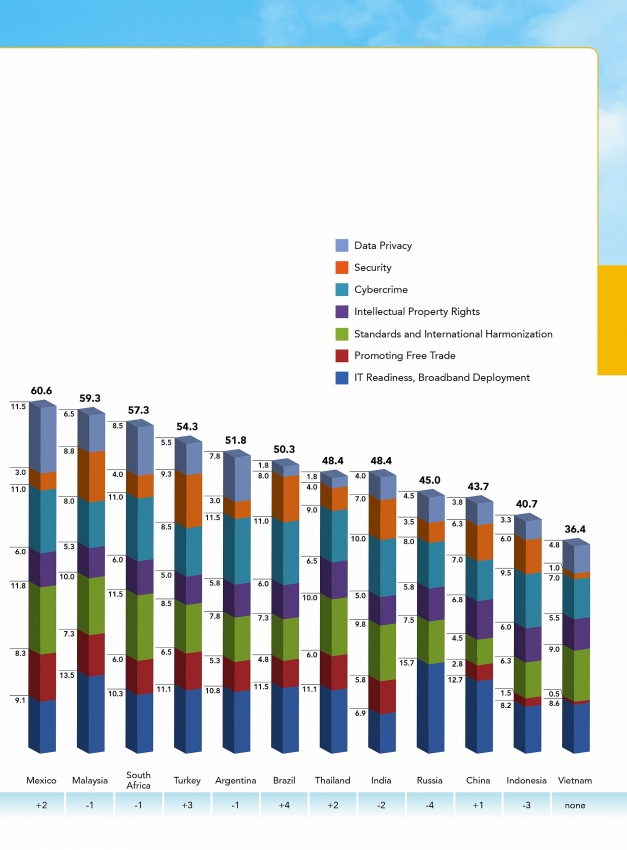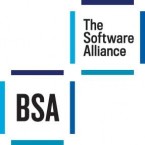Vietnam stalls in BSA Global Cloud Computing Scorecard rankings
 |
| Vietnam has been 24th since the first ranking |
This was the result of the 2018 Global Cloud Computing Scorecard, a flagship study that assesses cloud computing policies around the globe, released by BSA/The Software Alliance on March 8.
The 2018 BSA Global Cloud Computing Scorecard—the newest version of the only report to rank countries’ preparedness for the adoption and growth of cloud computing services—features an updated methodology that better reflects the policies that have helped the exponential growth of cloud computing over the past five years, putting additional emphasis on countries’ privacy and cybersecurity laws and broadband infrastructure.
In 2018, most countries continue to make improvements, but some markets are falling further behind. Germany scored the highest on the Scorecard—due to its national cybersecurity policies and promotion of free trade—closely followed by Japan and the United States. Bringing up the rear is a small group of nations that has failed to embrace the international approach: Russia, China, Indonesia, and Vietnam.
 |
| Scoreboard highlights continuing improvement in policy environment for cloud computing |
Scorecard’s first key finding is that advanced privacy and security policies set leading countries apart from lagging markets. Countries continue to update and refine their data protection regimes, most often in a way that enables cross-border data flows. Several countries, however, still have not adopted adequate privacy laws.
The second result is that emerging markets continue to lag in the adoption of cloud-friendly policies, hindering their growth. Examples include regulations that impose significant barriers for cloud service providers, data localisation requirements, and a lack of cybersecurity protection.
The third result is that deviations from widely adopted regimes and international agreements hold back key markets. Internationally accepted standards, certification, and testing help improve the security environment for cloud computing, but not every country recognises such best practices as meeting local standards.
The fourth is that those few countries that have embraced localisation policies pay a heavy price. Data localisation requirements act as a barrier to cloud computing, causing negative financial impacts for local markets.
The fifth is that increased emphasis on IT readiness and broadband deployment leads to interesting results. The ability of countries and companies to leverage cloud computing for growth requires access to a powerful network. While almost all countries continue to work to improve broadband access, the success of these efforts remains very inconsistent.
By examining the legal and regulatory framework of 24 countries, Scorecard aims to provide a platform for discussion between policymakers and cloud service providers. This dialogue can help develop an internationally harmonised regime of laws and regulations that facilitate cloud computing.
 |
| The ranking rate various that are essential to the improvement of the cloud computing environment |
“Scorecard is a tool that can help countries constructively self-evaluate their policies and determine next steps to increase adoption of cloud computing,” said Victoria Espinel, president and CEO of BSA/The Software Alliance.
“Cloud computing allows anyone to access technology previously available only to large organisations, paving the way for increased connectivity and innovation. Countries that embrace the free flow of data, implement cutting-edge cybersecurity solutions, protect intellectual property, and establish IT infrastructure will continue to reap the benefits of cloud computing for businesses and citizens alike,” Victoria Espinel added.
BSA/The Software Alliance is the leading advocate for the global software industry before governments and in the international marketplace. Its members are among the world’s most innovative companies, creating software solutions that spark the economy and improve modern life. With headquarters in Washington, DC and operations in more than 60 countries, BSA pioneers compliance programmes that promote legal software use and advocates public policies that foster technology innovation and drive growth in the digital economy.
The fifth is that increased emphasis on IT readiness and broadband deployment leads to interesting results. The ability of countries and companies to leverage cloud computing for growth requires access to a powerful network. While almost all countries continue to work to improve broadband access, the success of these efforts remains very inconsistent.
By examining the legal and regulatory framework of 24 countries, Scorecard aims to provide a platform for discussion between policymakers and cloud service providers. This dialogue can help develop an internationally harmonised regime of laws and regulations that facilitate cloud computing.
 | Unlicensed software use slightly down in Vietnam: BSA survey Computer users in Vietnam use unlicensed software at an alarming rate, despite being well aware of the associated cyber-security dangers, said a survey released yesterday ... |
 | BSA releases pirate software threat survey The Software Alliance, a leading advocate for the global software industry, last week released its latest survey on the security threats posed by illegal software ... |
 | BSA unveils new brand The Business Software Alliancehas unveiled a new brand identity reflecting a strategic alignment of its operations and the transformative impact of software on every aspect ... |
What the stars mean:
★ Poor ★ ★ Promising ★★★ Good ★★★★ Very good ★★★★★ Exceptional
Related Contents
Latest News
More News
- State corporations poised to drive 2026 growth (February 03, 2026 | 13:58)
- Why high-tech talent will define Vietnam’s growth (February 02, 2026 | 10:47)
- FMCG resilience amid varying storms (February 02, 2026 | 10:00)
- Customs reforms strengthen business confidence, support trade growth (February 01, 2026 | 08:20)
- Vietnam and US to launch sixth trade negotiation round (January 30, 2026 | 15:19)
- Digital publishing emerges as key growth driver in Vietnam (January 30, 2026 | 10:59)
- EVN signs key contract for Tri An hydropower expansion (January 30, 2026 | 10:57)
- Vietnam to lead trade growth in ASEAN (January 29, 2026 | 15:08)
- Carlsberg Vietnam delivers Lunar New Year support in central region (January 28, 2026 | 17:19)
- TikTok penalised $35,000 in Vietnam for consumer protection violations (January 28, 2026 | 17:15)

 Tag:
Tag:




















 Mobile Version
Mobile Version